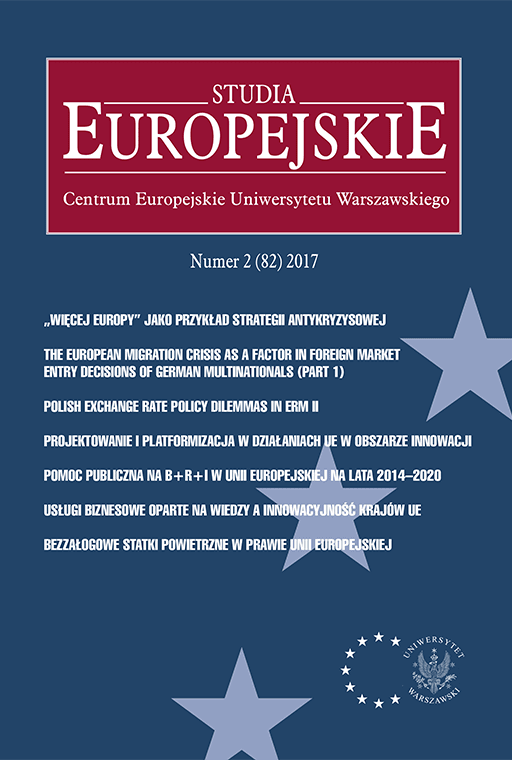
ISSUE: 2/2017
- Volume 82
- Number 2
- 2017
Subscribe NEWSLETTER
Studia Europejskie –
Studies in European Affairs
ISSN: 1428-149X
e-ISSN: 2719-3780
License
Articles published in the journal are under a Creative Commons Attribution – Non Commercial – No Derivatives 4.0 International License
The European Migration Crisis as a Factor in Foreign Market Entry Decisions of German Multinationals (Part 1)
Abstract
The largest influx of refugees since German unification has generated new challenges and opportunities in Germany’s society, culture, politics and economy. Theory advocates the advantages for international business of institutional change, migrations and integration. However, a negative public perception can conceal and inhibit resources and opportunities for German multinational enterprises. How did the attitude of Germany towards refugees change in 2015 and 2016? How did formal and informal German institutions react on the EU refugee crisis? How has this affected decision makers in German MNEs in terms of foreign market entry choices? How do German MNEs evaluate the long-term consequences of this crisis? This paper investigates in which ways the influx of refugees and migrants who arrived in Germany has affected the international business strategy of German MNEs. It is divided into two parts. Part One analyses the impact of this crisis on German culture, society, government, politics and economics and examines how it has been perceived and displayed. Part Two will further investigate how German MNEs are influenced by the migration context in Germany and Europe and how this affects their foreign market entry strategies in emerging economies.
References
Anderson E., Gatignon H., Modes of foreign entry: a transaction cost analysis and propositions, “Journal of International Business Studies”, No. 17/1986.
Aust S., Büscher W., Dowideit A., Lutz M., Malzahn C.Ch., Müller U., Peters F., Stoldt T.-R., Drei Stunden in der Angstzone: Eine Rekonstruktion, „Die Welt“ 10 Januar 2016.
Bae J.H., Salomon R., Institutional distance in international business research, 2010.
Barney J., Firm resources and sustainable competitive advantage, “Journal of Management”, No. 17/1991.
Berry J.W., Globalisation and acculturation, “International Journal of Intercultural Relations”, No. 32(4)/2008.
Bomsdorf E., Winkelhausen J., The demographic change remains unaltered despite high immigration rates: population estimates for Germany until 2060 on the basis of the 2011 census, “Ifo-Schnelldienst”, No. 67(47–48)/2014.
Brinkman S., Kvale S., InterViews: Learning the Craft of Qualitative Interviewing, Sage, 3rd Ed. 2015.
Buchenau M.-W., Das Herz der Münchner, Wirtschaftswoche, 2015, www. wiwo.de.
Charmaz K., Constructing grounded theory, Vol. 2nd., Sage Publishing Ltd., London 2014.
Corbin J.M., Strauss A.L., Basics of qualitative research: techniques and procedures for developing grounded theory, Vol. Fourth, Sage Publishing Ltd., London 2015.
Derrida J., The supplement of copula: Philosophy before linguistics, “The Georgia Review”, No. 30(3)/1976.
Fey C.F., Bjorkman I. The effect of human resource management practices on MNC subsidiary performance in Russia, “Journal of International Business Studies”, No. 32/2001.
Flick U., An introduction to qualitative research, Edition 5, Sage Publishing, 2014.
Hitt M.A., Dacin T., Levitas E., Arregle J., Borza, A., Partner selection in emerging market contexts: resource-based and organizational learning perspectives, “Academy of Management Journal”, No. 43/2000.
Lazaridis G., Security, insecurity, and migration in Europe, Burlington, Vt: Ashgate. 2011.
Ludwig T., EU einigt sich auf neuen Flüchtlingspakt: Hoffnung auf die Wende. Handelsblatt, 2016.
Lundan S.M., Dunning J.H., Institutions and the OLI paradigm of the multinational enterprise, “Asia Pacific Journal of Management”, No. 25(4)/2008.
Luo Y., Peng M.W., Learning to compete in a transition economy: experience, environment, and performance, “Journal of International Business Studies”, No. 30/1999.
Meyer K.E., Institutions, transaction costs, and entry mode choice in Eastern Europe, “Journal of International Business Studies”, No. 32/2001.
Meyer K.E., Estrin S., Bhaumik S.K., Peng M.W., Institutions, resources, and entry strategies in emerging economies, “Strategic Management Journal”, No. 30/2009.
Otto F., Flüchtlinge: „Was für ein tolles Land Deutschland ist“, „Die Zeit” 2015.
Oßberger B., So souverän meistert München den Ausnahmezustand, „Die Welt” 2015.
Peng M.W., The resource-based view and international business, “Journal of Management”, No. 27/2001.
Rodrigues M.J., Xiarchogiannopoulou E., The Eurozone crisis and the transformation of EU governance: internal and external implications. Burlington, Ashgate, Vermont, Surrey, England 2014.
Schmuck D., Matthes J., How Anti-immigrant Right-wing Populist Advertisements Affect Young Voters: Symbolic Threats, Economic Threats and the Moderating Role of Education, “Journal of Ethnic and Migration Studies“, No. 41(10)/2015.
Souto-Otero M., Villalba-Garcia E., Migration and validation of non-formal and informal learning in Europe: Inclusion, exclusion or polarisation in the recognition of skills? “International Review of Education”, No. 61(5)/2015.
Sutherland P., We must harness the true strength of migration. Organisation for Economic Cooperation and Development, “The OECD Observer”, No. 32/2015.
Tihanyi L., Griffith D., Russell C., The effect of cultural distance on entry mode choice, international diversification, and MNE performance: A metaanalysis, Journal of International Business Studies”, No. 36/2005.
UNHCR viewpoint: ‘Refugee’ or ‘migrant’ – Which is right? The UN Refugee Agency, 2016, http://www.unhcr.org/news/latest/2016/7/55df0e556/unhcr-viewpoint-refugee-migrant-right.html (last visited 23.08.2016).
Wefing H., Unter Schock, Die Zeit Verlagsgruppe, 2016.
Language: English
Pages: 23-41
How to Cite:
Harvard
Bodil Huyer, E. and Trouille, J. (2017) "The European Migration Crisis as a Factor in Foreign Market Entry Decisions of German Multinationals (Part 1)". Studia Europejskie – Studies in European Affairs, 2/2017, pp. 23-41.